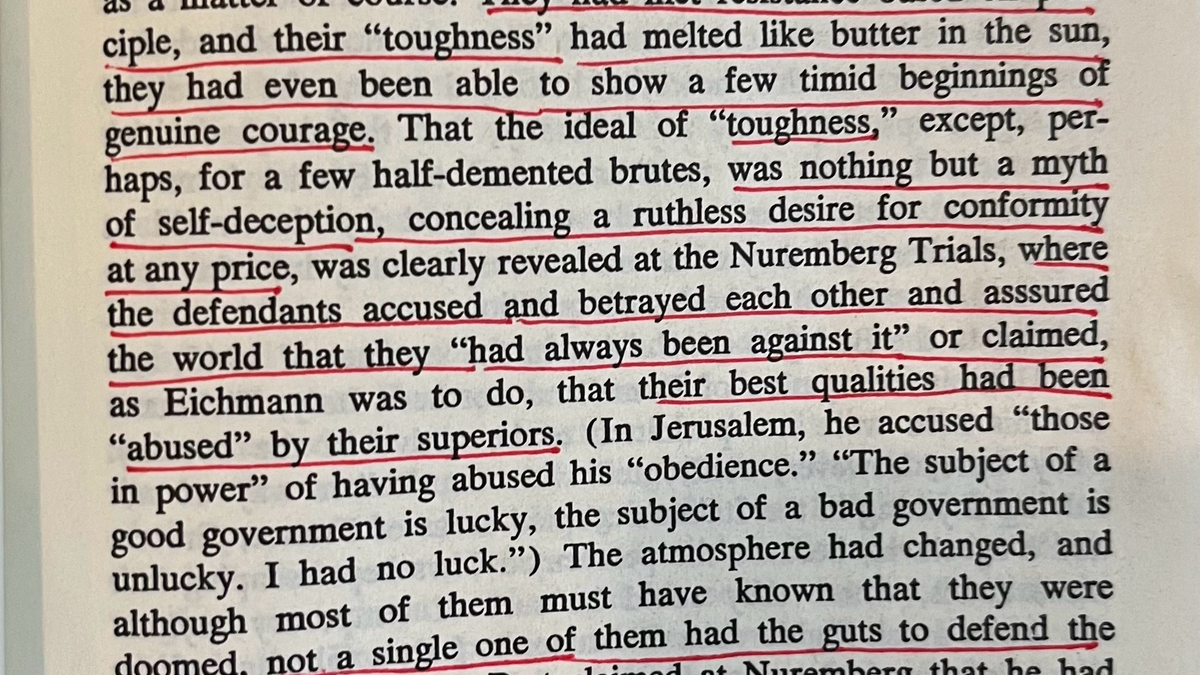Mentions
- Post
"Totalitarian policy does not replace one set of laws with another, does not establish its own consensus iuris, does not create, by one revolution, a new form of legality. Its defiance of all, even its own positive laws implies that it believes it can do without any consensus iuris whatever, and still not resign itself to the tyrannical state of lawlessness, arbitrariness and fear. It can do without the consensus iuris because it promises to release the fulfillment of law from all action and will of man; and it promises justice on earth because it claims to make mankind itself the embodiment of the law."

- Post
"Totalitarian policy claims to transform the human species into an active unfailing carrier of a law to which human beings otherwise would only passively and reluctantly be subjected. If it is true that the link between totalitarian countries and the civilized world was broken through the monstrous crimes of totalitarian regimes, it is also true that this criminality not due to simple aggressiveness, ruthlessness, warfare and treachery, but to a conscious break of that consensus iuris which, according to Cicero, constitutes a "people," and which, as international law, in modern times has constituted the civilized world insofar as it remains the foundation-stone of international relations even under the conditions of war. Both moral judgment and legal punishment presuppose this basic consent; the criminal can be judged justly only because he takes part in the consensus iuris, and even the revealed law of God can function among men only when they listen and consent to it."

- Post
"...modern form of tyranny, that is a lawless government where power is wielded by one man. Arbitrary power, unrestricted by law, wielded in the interest of the ruler and hostile to the interests of the governed, on one hand, fear as the principle of action, namely fear of the people by the ruler and fear of the ruler by the people, on the other- these have been the hallmarks of tyranny throughout our tradition."

- Post
"...one of Hitler's reasons for provoking this war was that it en abled him to accelerate the development in a manner that would have been unthinkable in peacetime. The remarkable thing about this process, however, is that it was by no means checked by such a shattering defeat as Stalingrad, and that the danger of losing the war altogether was only another in- citement to throw overboard all utilitarian considerations and make an all-out attempt to realize through ruthless total organization the goals of totalitarian racial ideology, no matter for how short a time."

- Post
"The assumption of infallibility, moreover, is based not so much on superior intelligence as on the correct interpretation of the essentially reliable forces in history or nature, forces which neither defeat nor ruin can prove wrong because they are bound to assert themselves in the long run. Mass leaders in power have one concern which overrules all utilitarian considerations: to make their predictions come true. The Nazis did not hesitate to use, at the end of the war, the concentrated force of their still intact organization to bring about as complete a destruction of Germany as possible, in order to make true their prediction that the German people would be ruined in case of defeat."

- Post
"The positivists' conviction, as we know it from Comte, that the future is eventually scientifically predictable, rests on the evaluation of interest as an all-pervasive force in history and the assumption that objective laws of power can be discovered."

- Post
"The essential point is that the necessities for propaganda are always dictated by the outside world and that the movements themselves do not actually propagate but indoctrinate. Conversely, indoctrination , inevitably coupled with terror, increases with the strength of the movements or the totalitarian governments' isolation and security from outside interference." - Hannah Arendt

- Post
"...in one form or another men must assume responsibility for all crimes committed by men, and that eventually all nations will be forced to answer for the evil committed by all others.
Tribalism and racism are the very realistic, if very destructive, ways of escaping this predicament of common responsibility. Their metaphysical rootlessness, which matched so well the territorial uprootedness of the nationalities if first seized, was equally well suited to the needs of the shifting masses of modern cities and was therefore grasped at once by totalitarianism..." - Hannah Arendt, The Origins of Totalitarianism, Page 236

